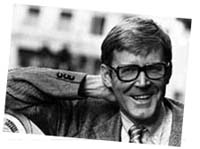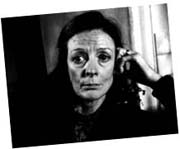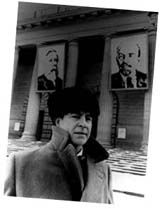Crying Through the Tears
Alan Bennett's comedies dare to be depressing.
Alan Bennett: Britain's Poet of Embarrassment
Oct. 22-Oct. 30, 1997
Walter Reade Theater, Lincoln Center, New York City

Sadness, while firmly in the ascendant in human affairs, is out of fashion in popular culture. Fifty years ago Hollywood churned out "weepers," a hundred years ago Dickens provided lachrymose delights to the millions; but we have dried our eyes. (Curiously, fear, entertaining a century ago, continues to amuse. Blood and explosions illuminate the screen. The "Goose Bumps" series chills younger readers. Amusement parks are festivals of fright: What is a roller coaster but the fear of falling rendered in steel?) Episodic television has a tough time exploiting tears. Sitcoms offer the comedy of reassurance--the natural order is established, ruffled, and restored in 23 minutes. In dramas, where hero cops, hero lawyers, and hero doctors caper and shoot, nothing too dreadful can befall a character who must be ready to roll/sue/stitch next week. One would expect our therapeutic age to cherish a good cry, yet where is it to be found? Look to Alan Bennett.
The author of essays and diaries, plays and screenplays (Prick Up Your Ears, The Madness of King George), Bennett has actually done most of his heartbreakingly sad, brilliantly funny writing for television. Well, British television.
It is the simultaneity of laughter and woe that gives Bennett's work an emotional complexity rare in comic writing. Second-rate humor deploys these emotions sequentially--the laughter turns to tears. This plays the audience for suckers, as if their irresponsible antics put someone's eye out. Bennett abjures the false and mawkish reversal of "but seriously, folks." The laughter never turns to tears; the tears turn to even more tears. In fact, Bennett's work is hardly comedy at all--it's very funny tragedy.
His tragedies are not Shakespearean; they are small, domestic, and utterly harrowing. The six monologues in his series Talking Heads, his best work, give us one death, one imprisonment, one brush with mental illness, one descent into poverty. His characters endure boredom, irritation, petty cruelty, deceitful relatives, and unsatisfactory sex--if they have any sex at all--ordinary misfortune. There's more gore in any Verdi opera, but no more tears and far fewer laughs.

T he monologues provide star turns for some wonderful actresses, particularly older actresses--Thora Hird as the cleaning-obsessed Doris in "A Cream Cracker Under the Settee"; Patricia Routledge as the putative guardian of public morals in "A Lady of Letters"; and the smart and rueful Maggie Smith as Susan, a vicar's wife secretly (or so she thinks) on the drink in "Bed Among the Lentils." Her monologue begins: "Geoffrey's bad enough but I'm glad I wasn't married to Jesus. The lesson this morning was the business in the Garden of Gethsemane when Jesus prays and the disciples keep falling asleep. He wakes them up and says, 'Could you not watch with me one hour?' It's my mother."

Things don't turn out well for Susan. Things seldom do in the monologues. In the only one with anything like a happy ending, the eponymous Lady of Letters finds contentment in jail. All very well for her. But Bennett leaves everyone else in a world where prison is the good news. His protagonists are generally denied even that modern compensation, self-knowledge. They are unreliable observers of their own lives. In "Soldiering On," the newly widowed Muriel (Stephanie Cole) never quite realizes the extreme treachery of her son, or the part she herself played in ruining her daughter. But we do. Bennett notes: "[T]hese narrators are artless. They don't quite know what they are saying and are telling a story to the meaning of which they are not entirely privy." Two of Bennett's few self-aware characters are those the world, if not the author, regards as wicked--the spies Guy Burgess and Anthony Blunt, each the hero of a film for television directed by John Schlesinger. An Englishman Abroad is based on an actual encounter in Moscow between Burgess and the actress Coral Browne, touring as Gertrude in Hamlet in 1958. He asks her impression of the city: "Loathe it, darling. I cannot understand what those Three Sisters were on about. It gives the play a very sinister slant."
And later: "If this is communism I don't like it because it's dull. And the poor dears look so tired. But then Australia is dull and that's not communism. And look at Leeds." (Bennett's birthplace, incidentally.) Burgess does look at Leeds, indeed at his entire nation, raising questions about patriotism in the work produced during the time of the Falklands War: "So little, England. Little music. Little art. Timid, tasteful, nice. But one loves it. Loves it. You see, I can say I love London. I can say I love England. But I can't say I love my country. I don't know what that means."
When its companion piece, the Anthony Blunt film, A Question of Attribution, ran on Masterpiece Theatre, Alistair Cooke apologized for what he considered the excessively sympathetic portrayal of Blunt. I don't recall him doing that as a preface to Richard III.
Burgess and Blunt are unlikely Bennett heroes--too active, too knowing, too bold. More typical is Graham, in the sad and dazzling "A Chip in the Sugar."Graham, performed by Bennett himself, is a middle-aged man caring for his mother (or is his mother caring for him?). It may be that the most frequently appearing Bennett hero is indeed something like Bennett. He describes that figure in the 1985 introduction to The Writer in Disguise, a collection of five Bennett teleplays produced and (in some cases) directed by Stephen Frears, for London Weekend Television:
Reading them now, five years after they were produced and six years after they were written, I can see that three of them (Me, I'm Afraid of Virginia Woolf; Afternoon Off; and One Fine Day) are not dissimilar and that Hopkins, the polytechnic lecturer, Lee, the Chinese waiter, and Phillips, the estate agent, share the same character, indeed are the same character. Passive, dejected, at odds with themselves, they are that old friend, the Writer in Disguise. A doleful presence, whatever his get-up, he slips apologetically in and out of scenes being heartfelt, while the rest of the cast, who are invariably more fun (and more fun to write, too) get on with the business of living.
As played by Neville Smith in Me, I'm Afraid of Virginia Woolf, Hopkins even looks like Bennett.
For many years Bennett has kept a diary, originally published in the London Review of Books and later collected in Writing Home. Here the writer sketches himself without the disguise: "11 November [1981]. An article on playwrights in the Daily Mail, listed according to Hard Left, Soft Left, Hard Right, Soft Right and Centre. I am not listed. I should probably come under Soft Centre." It's a miniature Alan Bennett play. There's a self-denigrating hero slightly ashamed of his own ambition. Nothing awful happens, but there's just a hint of failure. It's playful with the language, and the joke at the end is fresh and bittersweet.
Dr. Johnson, a writer who shares Bennett's enormous capacity for humor and gloom, observed that "Human life is everywhere in a state in which much is to be endured and little to be enjoyed." This is as good a summary of Bennett's work as any. This sad and funny man enjoys genuine popular appeal at home; it's a shame he'll never qualify here as must-see TV.